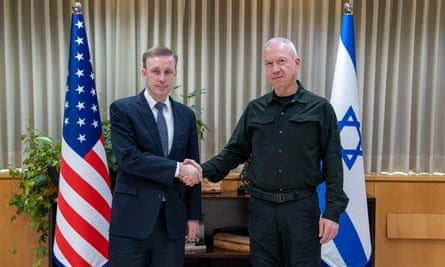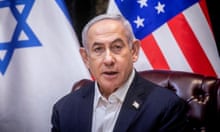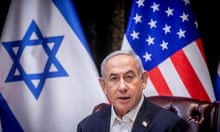The US is worried that Israel’s prime minister, Benjamin Netanyahu, may be willing to torpedo a potential normalisation deal with Saudi Arabia if it entails ending the war in Gaza and committing to working towards a two-state solution to the decades-old Israeli-Palestinian conflict.
The US secretary of state, Antony Blinken, told the Senate’s foreign relations committee on Tuesday: “There’s an opportunity for Israel to become integrated in the region, to get the fundamental security it needs and wants, to have the relationships it’s wanted since its founding. The Saudis have been clear that this would require calm in Gaza and a credible pathway to a Palestinian state,” he said, adding: “It may well be at this moment, Israel is not able or willing to proceed down this pathway.”
The Biden administration has been working for some time on a plan in which Riyadh would normalise relations with Israel in return for a formal defence pact with the US and assistance in developing a civilian nuclear programme.
For Israel, normalisation with the Saudi kingdom – the anchor of Sunni Islam and home to the religion’s two holiest sites – could in theory pave the way for the acceptance of the Jewish state across the Muslim world and shore up a nascent Arab-Israeli defence coalition against Iran.
Since the new war in Gaza began, the US has made ending the conflict a condition of a deal, as well as Israeli consent for a new governing mechanism in the strip involving the West Bank-based Palestinian Authority. A success would be a foreign policy boon for the US president, Joe Biden, who is facing an uphill battle for re-election in November.
But any concessions to the Palestinians are completely unpalatable for Netanyahu’s far-right coalition partners, who have vowed to collapse his coalition government if any such moves are made. Netanyahu sees remaining in office as his best chance of beating corruption charges, which he denies.

The US national security adviser, Jake Sullivan, discussed the prospective deal with Israeli officials on Sunday during a visit to the country, after a stop in the Saudi capital of Riyadh. According to Israeli media, Sullivan briefed that US and Saudi elements of the agreement were close to being finalised, and he was “deeply disappointed” by the Israeli response.
“With Bibi, there isn’t going to be normalisation with Saudi Arabia,” the Israeli daily Yedioth Ahronoth quoted him as saying, using Netanyahu’s moniker.
The sentiment was echoed by Israel’s national security director, Tzachi Hanegbi, who told Channel 13 News on Tuesday: “If there is a Palestinian state as a condition, there won’t be normalisation.”
An Israel-Saudi pact would build on the Abraham accords, agreements brokered by Donald Trump in which the UAE, Bahrain, Morocco and Sudan agreed to recognise Israel despite the ongoing occupation of the Palestinian territories.
Unofficial relations between Israel and the Gulf petrostate have been growing for years. Netanyahu and the kingdom’s powerful crown prince, Mohammed bin Salman, both signalled progress had been made on the matter on the sidelines of the UN general assembly in New York last year, a few weeks before the 7 October Hamas attack that triggered the new war.
To date, Saudi Arabia has stuck by the Arab peace initiative, a two-decade-old Arab League proposal pledging no diplomatic recognition of Israel without a just settlement to the Israeli-Palestinian conflict. Palestinian negotiators previously told the Guardian that they did not believe the new blueprint on the table would result in meaningful concessions towards peace or ending the 57-year-old occupation.
Moves to deepen US ties to Saudi Arabia and its unsavoury human rights record are likely to be a hard sell for Biden in the US Congress and Senate, but Biden was forced to re-engage after branding the kingdom a “global pariah” when Russia’s invasion of Ukraine sent the global oil markets into chaos.









